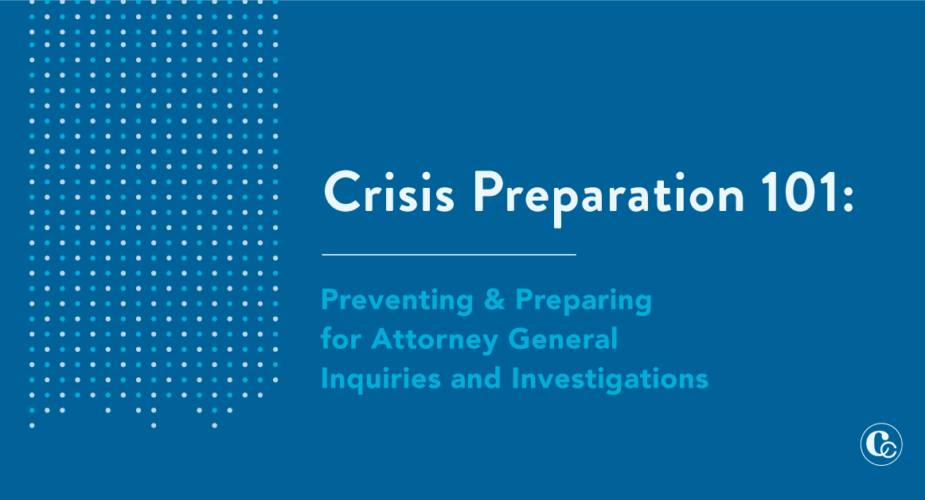Crisis Preparation 101: Preventing & Preparing for AG Inquiries and Investigations
As state attorneys general (AGs) continue to increase their enforcement activity and impact on corporate operations, it’s vital that companies in all industries build a crisis management plan for potential AG inquiries.
We sat down with Drew and Andrew Ketterer of Ketterer & Ketterer , a firm that concentrates its practice in helping organizations build meaningful relationships with AGs to discuss how companies can better prevent and prepare for an inquiry, investigation and possible civil litigation.
Drew is a former three-term Attorney General of the State of Maine and President of National Association of Attorneys General. Andrew formerly spent time in the North Carolina Attorney General’s office.
Curley: It seems that in the past 10-20 years AG activity has increased. Why are we seeing that pattern and do you think it will continue?
K&K: Around 20 years ago, there was a pivotal change in the way our public policy is made when all 50 state AGs became involved in litigation surrounding the tobacco industry’s advertising practices. This resulted in AGs realizing not only that they are able to create and impact public policy but also that they can often do so in a much more efficient way than the typical, legislative channels. From then onward, AGs continued to and still continue to expand their purview.
Curley: What industries are the most at-risk for AG inquiries or investigations?
K&K: Any company who produces a product or service in the U.S. needs to be paying attention to what their AGs are doing. Some of the issues we see being top of mind for AGs now or in the near future are environmental impacts, opioids, data collection and for-profit colleges. In the end, however, there probably isn’t any industry that state AGs won’t look into eventually, so it’s important for all organizations to be prepared.
Curley: How can organizations be proactive and lower the likelihood of an investigation?
K&K: It is really important for companies to begin building a relationship with their AG(s) as early as possible. We’ve seen so many cases when companies could have most likely prevented serious investigation–and therefore negative effects on their reputation, relationships and resources – if they had only taken the opportunity to get ahead of the issue and discuss their side of the story or business model with their AG(s). There would certainly be fewer issues if companies established open lines of communication pre-investigation or even pre-complaint. It is frequently this proactive, instead of reactive, procedure which can save companies tens or even hundreds of thousands of dollars.
Curley: What tactics have you seen prove effective for companies under investigation?
K&K: First, companies should engage the services of a law firm that concentrates in Government Affairs with State Attorneys General. Second, since state law gives Attorneys General broad investigative powers, companies should have their lawyer move to narrow the State’s request for documents and begin discussions with the State Attorneys General. This gives a voice to the company involved in the inquiry or investigation. Also, if it turns out that the company in question has violated the consumer protection laws, a pre-complaint settlement should be thoroughly explored. Third, if settlement can be reached, counsel for the company should work with the AG’s public information officer to draft a press release highlighting the company’s willingness to cooperate fully and make things right with consumers in the future.
Curley: In your experience, how receptive are AGs to establishing relationship with organizations?
K&K: During so many of the meetings we’ve had with our clients and their AG(s), the AG makes a point to thank us for orchestrating the meeting and note that he or she wished more companies would initiate such communications. AGs are constantly flooded with complaints, so any little step a company can take to make their office’s job easier by providing any relevant information and streamlining the ability to have effective communication is always appreciated and, in the end, will be beneficial to both the AG and the organization.
Curley and Ketterer have worked together to tackle both the public relations and government relations aspects of mitigating the impact of AG investigations. Wondering how to get started on your crisis communications plan? Check out our crisis e-book here .









